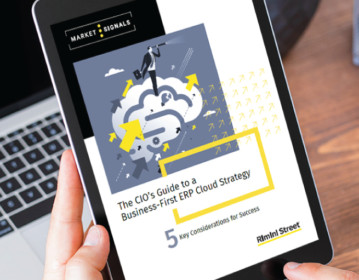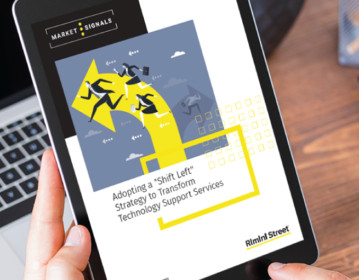We don’t make ERP or database software like Oracle and SAP. We support and manage that software. Over the past 15 years, we have helped over 3,000 clients save billions of dollars. It’s because we are built for support. Built to help clients avoid costly fees and ERP upgrades, so they can innovate and fuel growth. Other companies do software. We do support.
Additional resources

Adoption of third-party support for enterprise software is now mainstream. In a report sponsored by Rimini Street, industry research firm Valoir analyzed the growing acceptance of third-party support, finding that demand is widespread — from cost-cutters to innovators to a variety of companies in-between. Valoir found that in some instances, even ERP vendors reluctantly acknowledge the utility of third-party support as they focus efforts on the cloud. Third-party support has evolved into a strategic portfolio management tool for enterprise applications, gaining broader strategic acceptance from its origins as a cost containment tactic. Valoir found that its versatility facilitates: Innovation around the edges of a mature, highly functional ERP system Maximizing value from existing investments Taking a measured approach to cloud evolution Digital transformation Tactically, independent, third-party software support helps CIOs save resources and keep IT teams engaged with new initiatives rather than routine support. Strategically, it helps CIOs meet business objectives, demonstrate value, and move to a Business-Driven Roadmap from one dictated by an ERP vendor. In its report, Valoir specifically recognized Rimini Street for its: Breadth of knowledge and depth of support, featuring a dedicated engineer model Pure focus on independent, third-party support versus other IT or consulting services Track record of strong client relationships Value, service, price

IT teams are feeling the pressure to move everything to the cloud. IDC predicts that by 2023, digital transformation spending will account for half of IT budgets. The majority of that spend will go to cloud technologies. Cloud promises flexibility, elasticity, and cost savings — but only if you’re doing it for the right reasons guided by a business-first, not a cloud-for-cloud’s-sake, mentality. Before making the leap, especially with business-critical ERP systems, companies need a solid strategy. Rimini Street offers this ebook to look at the multiple elements of building a business-first cloud strategy that delivers maximum value and optimal performance. Topics covered include: Developing a Business-Driven IT Roadmap Avoiding common pitfalls of ERP in cloud Surviving the secondary effects of cloud moves Fast-tracking — without sabotaging — your cloud strategy

Thriving in a digital world means technology support providers and in-house IT teams need a collaborative service approach that integrates both technology and the human factor. “Shifting Left” addresses those needs by using software delivery practices to move knowledge closer to customers. Implementing this transformational approach will become critical as organizations turn to technology as a main conduit for meeting customer expectations…without losing the personal touch. But how do you make the shift? Helping you find balance between high-tech and high-touch, Rimini Street invites you to download this comprehensive guide to better understand the Shift Left method and lay the foundation for your transformation. In this ebook, you’ll learn: Three approaches to a Shift Left strategy What’s driving the Shift Left trend The benefits of shifting left and why it makes you more competitive How to embrace and implement your Shift Left strategy






